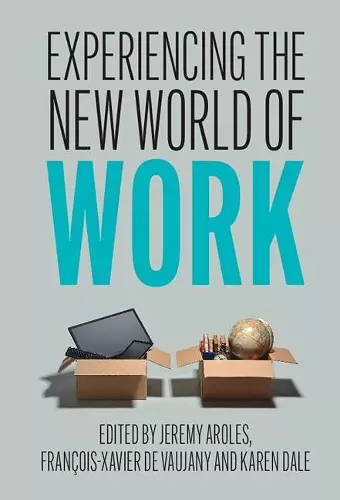Experiencing the New World of Work
Jeremy Aroles editor François-Xavier de Vaujany editor Karen Dale editor
Format:Hardback
Publisher:Cambridge University Press
Published:21st Jan '21
Currently unavailable, and unfortunately no date known when it will be back
This hardback is available in another edition too:
- Paperback£30.99(9781108791090)

This edited volume explores, theorises and critically investigates different facets of the new world of work.
Drawing from many different conceptual and empirical lenses, this book offers a critical exploration of various facets of the new world of work. It will appeal to a broad readership of management and organizational scholars as well as sociologists interested in current changes to the world of work.Exploring the different facets of the new world of work (including the hacker and maker movements, platform work, and digital nomadism), this edited volume sets out to investigate and theorise how these new work practices are experienced by various actors. It explores such changes at both the micro and macro levels and sets out to link them back to wider social, managerial and political issues. In doing so, it aims to reflect on the similarities and differences between new and 'old' work practices and problematize discourses surrounding the future of work. This volume is characterized by the diversity of methods mobilized, the plurality of concepts, lenses and theories deployed as well as the richness of the empirical accounts used by the authors. It will appeal to a broad readership of management and organizational scholars as well as sociologists interested in current changes to the world of work.
Is there one future of work? This excellent volume shows that employment continues to be contested. For some, the the digital frontier of control has moved into the home or the delivery van. For others, the care home or field continues to be the site of low paid manual work. If you want a serious and evidence based analysis of current trends and future possibilities, then read this book. Martin Parker, Professor of Organisation Studies, and Lead for the Bristol Inclusive Economy initiative, Department of Management, Bristol University
In an increasingly volatile, but also strangely predictable world, it is more important than ever that we remain academically alert to both the changes and continuities that characterise the experience of work. This rich and timely collection, focusing on the impact of contemporary workplace practices of – amongst others – embodiment, spatiality, and digitisation, makes a vital and accessible contribution to this endeavour. Philip Hancock, Professor of Work and Organisation, Essex Business School, University of Essex
Why, asked the poet Philip Larkin, did he find the toad work squatting on his life? His answer was typically laconic: because inside himself, he observed, there was something toad like too, cold and heavy, always weighing on him. Work was its outward expression. Without the in-trays, regular hours, pension rights, class exploitation, and doleful routine he would be like those roaming or stumbling around the parks mid-afternoon with only empty chairs for friends. Within work, well, he was at least distracted from the inevitability of death. Nowadays, the toad has become a pond skater, neither heavy nor cold: it is elusive, nebulous, and humming with mediating technologies, and the empty chairs around the park bandstand have become workstations. It is in such a setting that the essays in this volume become incredibly timely. They give voice to a new, mobile cast of characters in the world of work: hackers, nomads, teleworkers, learning algorithms, makers, and platforms, in short a veritable commedia dell arte for our technologically mediated times. We learn how working humans are being joined by (better?) working non-humans, how exploitation has become a lifestyle choice – or intensified by poverty and confined invisibly to the peripheral spaces of the globe – and how, if there is any meaning to be found in such fluid, often exaggerated, and transitory experiences, it comes doused in irony. The field of study that is still, rather quaintly, called human relations needs completely uprooting. This volume makes an admirable foray into this radical work. Robin Holt, Professor, Department of Management, Politics and Philosophy, Copenhagen Business School
ISBN: 9781108496070
Dimensions: 230mm x 150mm x 20mm
Weight: 550g
250 pages